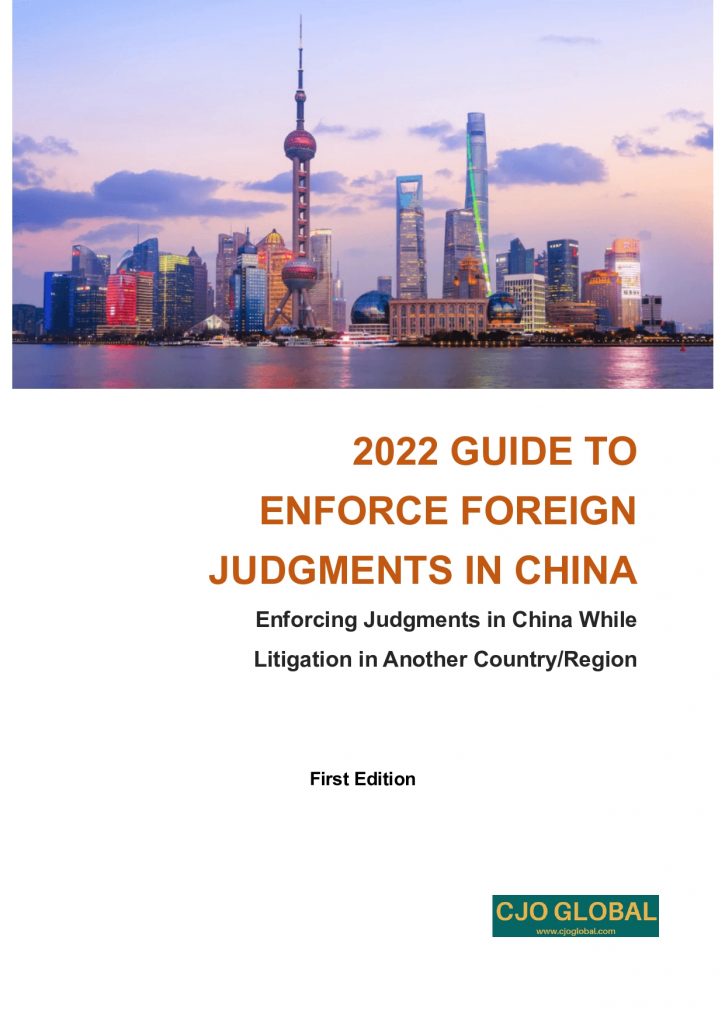One Minute Guide to Enforce your Judgments in China
Yes, foreign judgments can be forced in China.

2022 GUIDE TO ENFORCE FOREIGN JUDGMENTS IN CHINA
Enforcing Judgments in China While Litigation in Another Country/Region
1. Can foreign judgments be enforced in China?
Yes.
China has adopted a more friendly attitude towards the enforcement of foreign judgments in China since 2015, with a handful of successful cases concerning the recognition of judgments of several countries, including the United States, Singapore and South Korea.
On this basis, China’s Supreme People’s Court(SPC) has started applying new rules in 2022 that will make foreign judgments as likely to be recognized and enforced in China as they are in common-law countries or civil-law countries like Germany.
Therefore, you can feel confident to consider enforcing your judgments in China after 2022.
2. What types of foreign judgments can be enforced in China?
Foreign civil and commercial judgments, civil compensation in criminal judgments and bankruptcy judgments may be recognized and enforced in China.
However, the relevant judgments of intellectual property cases, unfair competition cases and anti-monopoly cases will not be recognized and enforced in China due to the geographical attributes and particularity thereof.
3. Under what circumstances, will the Chinese court refuse to enforce the foreign judgment I obtained?
i. In accordance with the law of the People’s Republic of China, the court that rendered the judgment has no jurisdiction over the case;
ii. The defendant did not receive proper notice of the judicial proceedings or have a reasonable opportunity to argue, or the incapacitated defendant did not receive appropriate representation in accordance with the law of the place where the judgment was rendered;
iii. The judgment is obtained by fraud or bribery;
iv. The court of the People’s Republic of China has rendered a judgment on the same dispute between the same parties, or has recognized the judgment of a third country in this regard;
v. Recognition and enforcement of the judgment concerned will violate the basic principles of the laws of the People’s Republic of China or the sovereignty, security, and public interests of the state.
vi. Where a foreign judgment awards damages, the amount of which significantly exceeds the actual loss, a people’s court may refuse to recognize and enforce the excess.
4. Do I need to pay the court fees, if I want to apply to Chinese courts for recognition and enforcement of a foreign judgment?
Yes.
According to our study, court costs are usually no more than 1.35% of the amount in controversy or 500 CNY.
When you win the case, the court fee shall be borne by the respondent.
5. How long would it take to enforce the foreign judgment?
For the recognition or enforcement of foreign judgments in China, the average length of proceedings is 584 days.
According to our study, the length of proceedings for recognition and enforcement of a judgment can be divided into two stages:
(1) recognition: 344 days
(2) enforcement: 240 days
Do you need support in cross-border trade and debt collection? CJO Global's team can provide you with China-related cross-border trade risk management and debt collection services, including: (1) Trade Dispute Resolution (2) Debt Collection (3) Judgments and Awards Collection (4) Anti-Counterfeiting & IP Protection (5) Company Verification and Due Diligence (6) Trade Contract Drafting and Review If you need our services, or if you wish to share your story, you can contact our Client Manager: Susan Li (susan.li@yuanddu.com). If you want to know more about CJO Global, please click here. If you want to know more about CJO Global services, please click here. If you wish to read more CJO Global posts, please click here.

Photo by Chongming Liu on Unsplash







